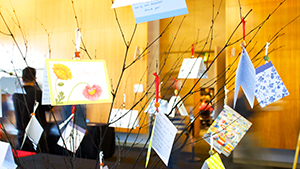May 19, 2014 - By Tracie White

For a project titled The Thank-You Cards You Have Yet to Send, medical students recognize the importance of patients as teachers. Credit: Jia Luo
Perhaps the most important teachers in a medical student's career are their patients. Without them, a student could never become a doctor.
In an effort to honor these often-unsung teachers, a group of fourth-year medical students started a project, The Thank-You Cards You Have Yet to Send, by handing out a batch of empty thank-you cards to their classmates. The 35 or so cards they got back are filled with heartfelt sentiments from medical students to patients describing just how important they have been on their journey to becoming physicians:
"To a patient dying of cancer: Thank you for teaching me that when I no longer have anything to offer you from the science of my craft, that I can still offer you the companionship of my humanity."
"The project grew out of a desire to show appreciation for patients who have touched us emotionally or taught us important lessons as medical students," said James Xie, one of the organizers of the project, which was displayed in April at the Medicine and the Muse Symposium.
"The main idea was that after four years of medical school, we've thanked family, friends and teachers. But a large part of our clinical training has come from patients," said Jai Madhok, another project organizer.
By putting the cards on display, the students hope that the messages — which do not name either the writer or the recipient because of confidentiality concerns — still somehow reach patients.
"Realizing that when you come back the next day, your patient might not be there, that's hard to grapple with," Madhok said. He wrote a thank-you note to a stroke patient who he helped care for during the last days of the patient's life:
"I will always remember that you asked me for an ice-cold Slurpee from 7-Eleven in broken words when you finally gained orget your gentle but firm nod, expressing that you wouldn't want artificial feedings prolonging your life. ... Taking care of patients like you and helping them in times of need makes medicine worthwhile. ... You taught me how to be a good physician and I will always remember you."
"Patients tend to stay with you," Madhok said. "You may forget their exact diagnosis, but you remember them."
Xie agreed, adding that he will always remember the first patient he ever stitched up, a teenager who had punched her hand through a pane of glass:
"You had a gaping laceration on your hand which you let me suture up — it was my first time suturing but you were so patient with me. Thank you. I'm sure you were just as scared as I was!"
In addition to Xie and Madhok, the project was conceptualized and designed by the following members of the medical school's chapter of the Gold Humanism Honor Society: Jia Luo, Hong-An Nguyen, Julia Pederson, Jessi Humphreys and Leon Castaneda. The group's adviser was Lars Osterberg, MD, clinical associate professor of medicine.
About Stanford Medicine
Stanford Medicine is an integrated academic health system comprising the Stanford School of Medicine and adult and pediatric health care delivery systems. Together, they harness the full potential of biomedicine through collaborative research, education and clinical care for patients. For more information, please visit med.stanford.edu.